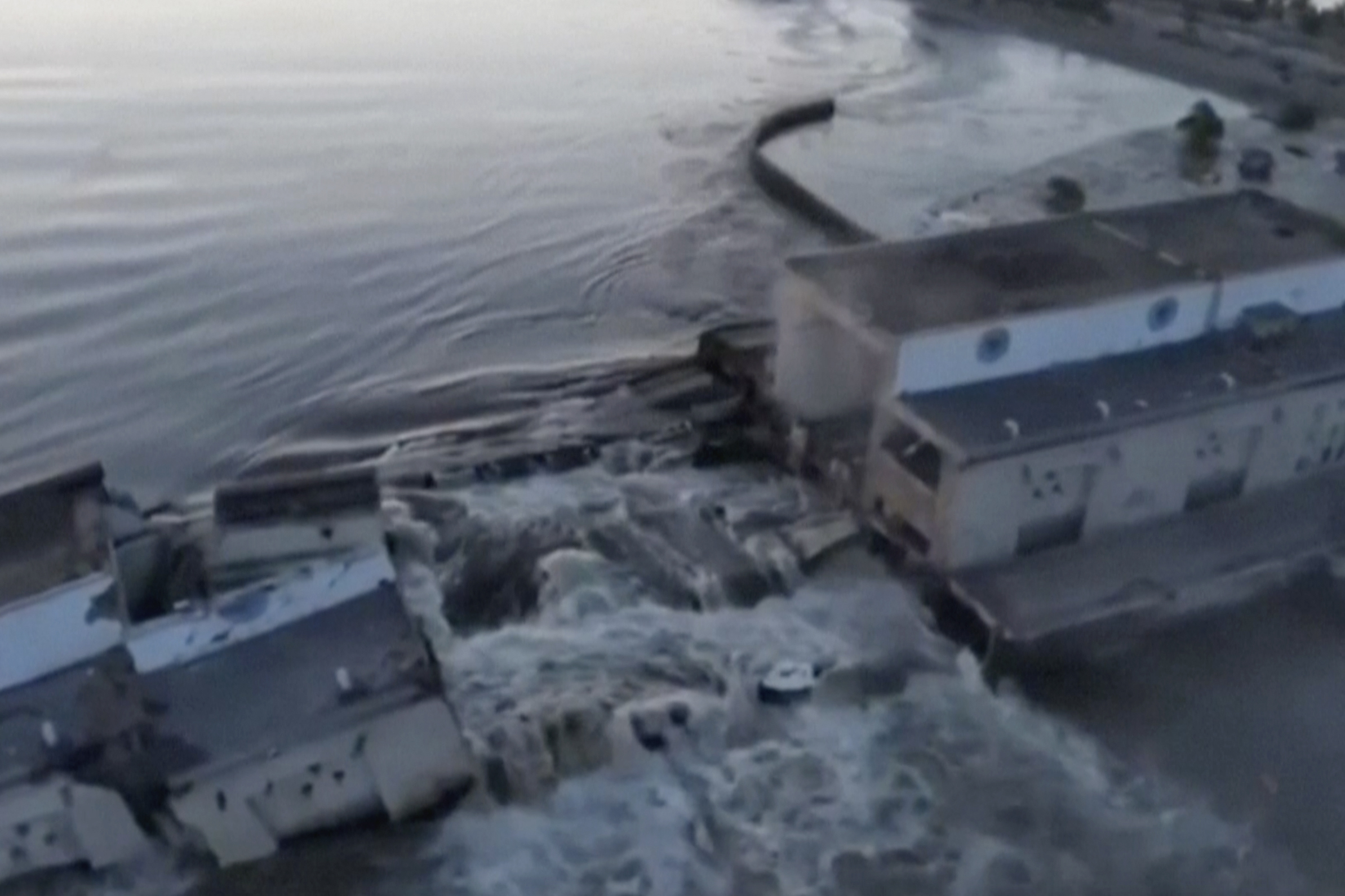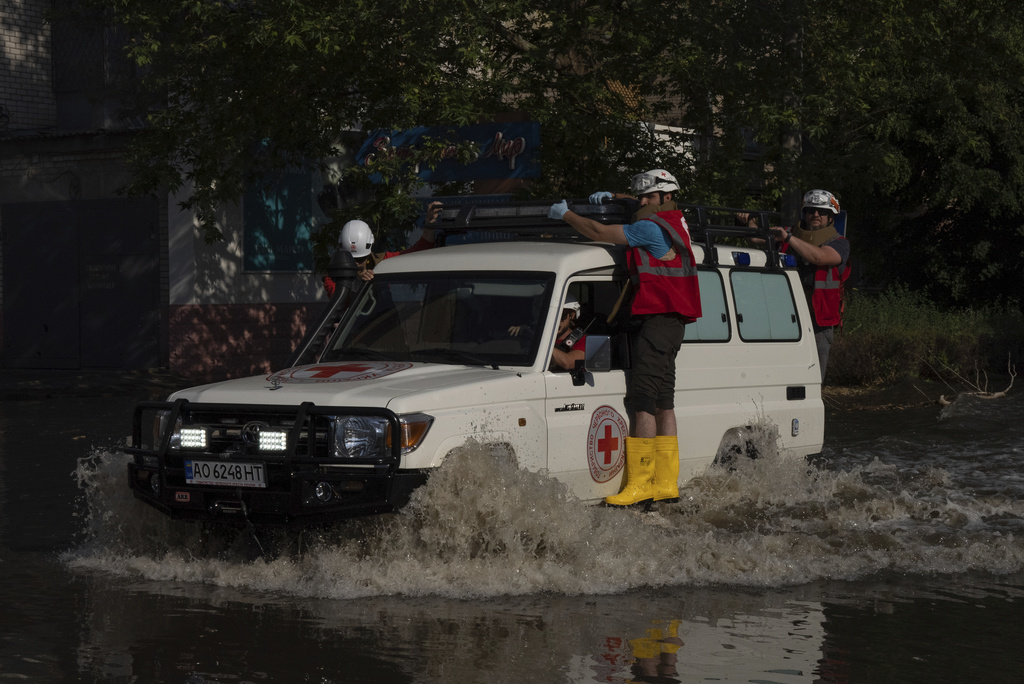
Hundreds of people have been evacuated from settlements along the southern stretch of Ukraine’s Dnipro River after water burst through the breached Nova Kakhovka dam, submerging streets and town squares.
The collapse of the structure at the southern tip of the vast Kakhovka Reservoir on Tuesday unleashed a torrent of water, adding to the misery of thousands of people who have been caught on the front lines of Russia’s war in Ukraine.
Kyiv accused Russian forces of blowing up the dam and hydroelectric power station in an area of southern Ukraine that Moscow has controlled for more than a year while Russian officials blamed Ukrainian bombardment. It was not possible to verify the claims.
Ukrainian President Volodymyr Zelenskyy said the dam breach is the “biggest man-made environmental disaster in Europe in decades”.
“It is physically impossible to blow it up somehow from the outside with shelling,” he said in a video address to a summit of European countries in the Bucharest Nine group. “It was mined. It was mined by the Russian occupiers and blown up by them.”

Floodwaters rise
Footage posted on social media shows severe flooding in the Russian-controlled town of Nova Kakhovka, which is next to the dam.
Its Russian-installed mayor, Vladimir Leontyev, said water levels had risen to more than 11 metres (36 feet) and some residents had been taken to hospital, Russia’s TASS news agency reported. He said 900 people had been evacuated.
Leontyev added that 53 evacuation buses were being sent to take people from Nova Kakhovka and two nearby settlements to safety.
“We are organising temporary accommodation centres with hot meals,” he said.
Journalist Yulia Shapovalova said from Moscow that the machine room of the Kakhovka power station was “under water”.
“We’re getting pictures of entire houses floating down the Dnipro River,” she said.
According to Shapovalova, Russian authorities said the partial destruction of the dam has led to flooding and the “washing-away of entire agricultural fields” along the river.
Evacuations under way
The Russian-installed administration in the partially occupied Kherson region said it was preparing to evacuate three districts – Nova Kakhovka, Golo Pristan and Oleshky. The latter two lie across the mouth of the Dnipro River from the Ukrainian-held regional capital, also called Kherson.
Water levels there had already risen by more than a metre (3.3 feet), residents said, and were expected to rise further.
“The water flow in the Dnipro River and its tributaries is very powerful,” Kherson resident Oleksandr Syomyk said as he stood beside the swollen river.
“The water level rose by one metre. We’ll see what happens next, but we hope for the best.”
Ukrainian police released a video showing an officer carrying an elderly woman to safety and residents wading through knee-deep water in the Kherson region.

Ukraine’s prosecutor general said thousands of people were being evacuated from flooded areas.
“Over 40,000 people are in danger of being flooded. Ukrainian authorities are evacuating over 17,000 people,” Andriy Kostin said on social media, adding that 25,000 more people should be evacuated on the Russian-occupied side of the Dnipro River.
Oleksandr Tolokonnikov, a senior official in Ukraine’s Kherson military administration, warned that worse was to come.
“Tomorrow there will be a peak [of flooding]. Then there will be a decline,” he told an online media briefing earlier on Tuesday.
“We already evacuated about 1,000 people. We have about 50 buses shuttling between Kherson and the affected villages. In Kherson, we have four evacuation sites prepared.”
Ukraine’s interior ministry said 24 villages have flooded.
“I was evacuated from the flooded village of Antonivka. Our local school and stadium downtown were flooded. … The road was completely flooded. Our bus got stuck,” Lidia Zubova, 67, told the Reuters news agency as she waited for a train to leave Kherson.
The World Data Center for Geoinformatics and Sustainable Development, a Ukrainian nongovernmental organisation, estimated that nearly 100 villages and towns would be flooded and the water level would start dropping only after five to seven days.
Both sides warned of a looming environmental disaster. Ukraine’s Presidential Office said about 150 tonnes of oil escaped from the dam machinery and that another 300 tonnes could still leak out.
“The human and environmental cost of the destruction of the Kakhovka dam is a huge humanitarian disaster,” said Marie Struthers, Amnesty’s Eastern Europe and Central Asia director.
“The destruction of the Kakhovka dam is a catastrophe that endangers the life, safety and well-being of tens if not hundreds of thousands of people living within range of the flood waters,” she said.
“There must be a prompt, independent and impartial investigation into the destruction of the Kakhova dam.”

Zaporizhzhia nuclear plant
The dam supplies water to farmland in southern Ukraine and the Russian-occupied Crimean Peninsula. It also cools the Russian-held Zaporizhzhia nuclear plant.
The UN nuclear watchdog said Europe’s largest nuclear power plant should have enough water to cool its reactors for “some months” from a separate pond even as the reservoir drains out. It called for the pond to be spared.
Damage to the dam creates a new humanitarian disaster just as Ukraine is unleashing a long-awaited counteroffensive to drive Russian troops from its territory.
The Geneva Water Hub, a water research and policy institute, said it was “deeply concerned”.
“The devastating consequences for civilians are likely to reverberate long after the flooding has stopped,” it said in a statement.







